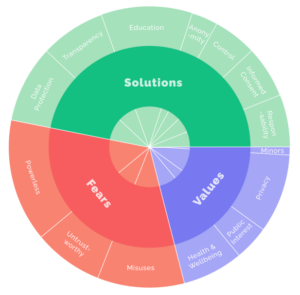Public trust in research
In the digital age, data is a critical component in various aspects of our lives, playing a pivotal role in research across diverse fields. From healthcare, understanding vaccine reactions, to media studies and the spread of fake news, data-driven research has led to significant advancements.
However, with these advancements come ethical questions that must not be overlooked:
- Are individuals aware that their data is being used for research?
- Do individuals consent to their data being used for research, beyond agreeing to general terms of use?
- Is there a discernible disconnect between researchers and the individuals whose data they utilize?
Originating at the University of Zurich, the project seeks to delve into these questions by conducting focus groups throughout Switzerland. The study started with focus groups in German-speaking Switzerland, followed by additional groups in French-speaking Switzerland, thanks to the collaboration with the University of Geneva. Future plans include extending these discussions to Italian-speaking Switzerland.
This website presents the key themes that emerged from our focus groups conducted in French-speaking Switzerland. Each theme is represented by contrasting quotes to highlight the diversity of opinions about data usage in research.
In the course of our focus groups, three major themes emerged: Fears, which encompass the concerns and challenges related to data use; Solutions, which propose ways to address these challenges; and Values, which highlight the principles that should guide our approach to data use in research.
In the following sections, we choose to share some of the comments shared during the various focus groups!

Fears
Misuses
“If the government uses our data against the citizen, for example, to refuse a social benefit, it is problematic”
Untrustworthy
“I am sure that the conditions will be changed, or that it can be done even if we refused…”
Powerless
“When we share anything online (e.g. profile picture on facebook), anyone can use them or find the person (facial recognition) and nothing protects them”
Solutions
Legal framework
“Mental health is complicated, we don’t even have a computerized health file in Switzerland. It is absolutely necessary to be able to guarantee the use of these data, to make sure at all costs that they are NOT made public”
Transparency
“You need to have a clear picture of who is harvesting what and for what purpose, and then you are free to decide, but first you need to know”
Education
“Being aware of this data collection can lead to less sharing”
Anonymization of data
“use of data in stat studies: acceptable (anonymous). Not for recognizing a person”
Control of data and its use
“A private message asking for the use of the data, rather than going through an intermediary. Or a small reminder periodically (rather than just at registration)”
Informed Consent
“Giving explicit consent to use the data should be the norm. Nobody reads these terms and conditions, they are too long”
Values
Health
“Google offers the phone number of a suicide hotline as the first result in case of a worrying search, that’s reassuring”
Public Interest
“It is less problematic if it is the public authorities that collect and analyze the data, they are not supposed to have dubious interests”
Protection of minors
“No, they are not of age, they do not have the necessary capacity of discernment. What comes from them should not be taken into account.”
These focus groups were done in collaboration with the University of Geneva with the help of the following students:
- Togbé Agbessi ALANGUE () Droit
- Joao COSTA DA QUINTA () Sciences
- Artémis FAULK-ANTONAKIS () Sciences de la société
- Léa HEINIGER () Sciences
- Manon HAULOTTE () Psychologie et sciences de l’éducation
- Camille LUISIER () Global Studies Institute
With the help of the teaching assistant: Zoé HUBER ()
In the context of the class « Comprendre le numérique », coordinated by teachers Yaniv Benhamou and Seth Médiateur Tuyisabe.
To learn more about this project you can go the the university’s page.



